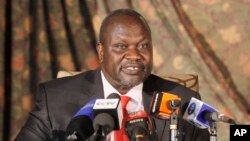A spokesman for South Sudan's president says he is considering waiting to name a new transitional unity government until his political rival, Riek Machar, takes up his post as vice president.
President Salva Kiir had given Machar until early Friday morning to take up his position as part of a peace accord the two signed to end months of civil war. But Machar said he would return to Juba only after the city was demilitarized, as stipulated in the agreement.
Presidential spokesman Ateny Wek Ateny said Kiir could wait to name a new transitional unity government in the interest of peace.
Kiir "might give further time for Dr. Machar to come to Juba in order for the government of national unity to be complete," Ateny said. "This is what the people of South Sudan want. ...
“It still remains the prerogative of the president to see the next cause of action, and he is the one to pave the way forward. So it is up to him, whether he will dissolve the [current] government and form a government or he still gives more time for Dr. Riek Machar to come.”
The Sudan Tribune quoted James Gatdet Dak, a spokesman for Machar, as saying that without the implementation of the security arrangement in the peace agreement that includes the demilitarization of Juba, Machar would not return as demanded by Kiir.
'Very important'
“This is the reason we said the appointment of the first vice president was rushed and did not follow the sequence of the implementation of the peace agreement," Dak said. "Although it is in line with the provisions of the power-sharing agreement, it is a redundant action because the first vice president will not take oath of office until he arrives in Juba.
“We will not accept this. Dr. Machar will not return to Juba until the capital is demilitarized and our forces are deployed. This is what the peace agreement says. It is for rebuilding trust as well as for protection and deterrence. Somebody has to understand that this is very important.”
Ateny said Juba was likely to be demilitarized within the next few days. He added, however, that the formation of the transitional national unity government was well overdue.
Supporters of Machar said the government in Juba was to blame for the delays in the formation of the government. They cited Kiir’s “unilateral” decision to establish 28 new states from the existing 10, which conflicted with the power-sharing provision in the peace accord.
Ateny said the accusation was without merit.
“The IGAD [Intergovernmental Authority on Development] and IGAD partners and friends of South Sudan have been urging President Kiir to form the government," he said. "Whenever there is a blame, the two sides are blamed that they are failing or dragging their feet in the formation of the government of national unity. So that’s why the president saw it appropriate to give seven days to Dr. Riek Machar to come to Juba, so that they can form the transitional unity government together.”
He said if the vice president stayed away for more than a week, the president might be forced to form a partial government, leaving some positions open until Machar returned to Juba.




